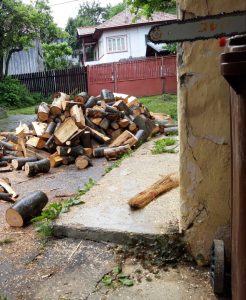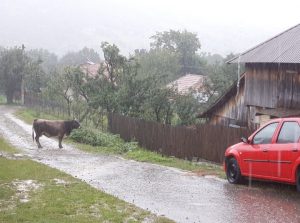5 things when you are living in a rural area in Romania.
The house :
If you have a light sleep, it’s 5 am and you wake up because the rooster from the farm next door thought it would be a good idea to start the day at that time. Otherwise it’s 9 am and it’s time to get up.
First step, the bathroom. Living in a typically traditional house, this one isn’t really at the cutting edge of technology. If you are in winter, it’ll probably be very cold. It’s therefore strongly recommended to buy a small auxiliary heater. It’s also possible that you have no water but no panic, usually you’ve at best 30 minutes to wait and at worst 4 days. This often happens after a lot of rain, so take your precautions!
Once this step is completed, you should know that toilet paper don’t go into the toilet but into the next bin.
You should also know that in this type of house, there’s no centralized heating. You’ll therefore have to make a fire in each room if you want your house to be heated. For that you will obviously have to cut wood and dry it otherwise it will not take.
Despite all this, life in a traditional house is a very relaxing thing, life is simple and it’s very pleasant to wake up for example with a view of the mountains and a beautiful sunrise.
The transport service :
In Romania, in rural areas, transport isn’t very efficient. Sometimes you only have 2 or 3 buses during the day. It’s also true that trains are rather slow. So if you want to get somewhere as soon as possible, the best way is still to hitchhike. As everywhere it’s always advisable not to do it alone, but it’s always the easiest way to get from point A to point B.
However, if you want to take your time and enjoy your trip, I strongly recommend the train. You’ll have the opportunity to enjoy the wonderful landscapes that Romania has to offer. You’ll also meet many great people who will be happy to help you on your journey.
The language :
Being in another country it’s normal that you do not speak the same language. Romanian is a Latin language and has a lot of similarities with French, for example, so you can always try to make yourself understood. In rural areas, very few people understand and speak English, so it’s strongly recommended to learn a few words that will be useful to you such as: count to 10; say hello; or ask for directions. No matter how many mistakes you make, the person you’re talking to will usually be very happy if you make the effort to speak their language. So don’t hesitate to get started!
The shopping :
Generally in small villages, you can find many small shops. You can find the essentials there. It’s very convenient when you’re missing something. The disadvantage is that very few of them take the card. You will therefore constantly need to have change with you just to be sure.
What is also good in Romania are the “Second Hands Shops”. There are some everywhere and you can really find great and cheap things. In an average city there are usually at least 4-5 of them and if you’re in a small village just look around and you will certainly see at least one. Again, they do not normally take the card or so rarely fill up with change.
The food :
You can’t go to a country without tasting traditional food. There are many very different dishes but the main ingredient will often be meat. For a Romanian person a meal isn’t a real meal without meat. Even if you can eat meatless dishes like Mămăligă or Sarmale, which are made of corn and cabbage respectively.
Don’t hesitate to visit one of these small open markets to taste Mici and find fresh and local produce. During this short outing you will also see people selling alcohol in water bottles. These are Pălinca and Țuică, traditional alcohols made from fermented fruit (usually plumbs).
In Romania, you also have some special bakeries. Indeed, you can’t really get into it but you have to order what you want at a small window. Some are specialized in the sale of sweet products and others in salty products.
In short, don’t be afraid to make new experiences, you’ll be pleasantly surprised. Romania is a beautiful and welcoming country!
Discovering Romanian culture –
The topic of the following article is « Discovering the romanian culture ». In here, I would like to talk about what I felt as differences from France in Romania, considering the culture as a set of patterns gathering specific beliefs, behaviours, language, method of production … shared by people constituting a specific society this way. Living in Schiulesti, in Izvoarele commune, I experiment far more the rural Romania than the urban one. And talking about way of living, it seems to make a big difference. However, I’d like to specify the fact that I don’t speak romanian, what does not help to create a contact with the neighbourhood. In Schiulesti for example it is rare to find someone who speaks English. It is a rural area specificity I guess, in Bucharest almost everybody speaks English. What I mean is that my first personal observations are maybe not this significant because of not enough dialogues with natives.
First I’d like to talk about something which surprised me: paradoxical feelings some Romanian have toward their country being both proud and ashamed. In the streets, both in where we live and in Bucharest we can see Romanian flags hung on a balcon or in the garden what only happens during the football world cup in France, especially when the french team win! In Schiulesti, many people talk about the beauty of the landscapes surrounding the village, and more generally the inhabitants seem interested in sharing traditions such as preparing sarmale for Christmas. Sometimes this pride seems to be extreme, expressed by a strong feeling of patriotism and especially with a bipolar vision dividing still the world between west and east as if the cold war never finished. Indeed, we’ve already had dialogues turning into conflict just talking about our studies in France, we felt then this resentful we can find in here toward the west. Also, this strong expression of patriotism is often shared with a discriminatory vision of the society rejecting both gypsies, homosexuals, more generally the minorities. If those people want to remain in Romania forever and ever, there are others who express easily shame toward Romania. For example, when we said to a cashier we enjoyed our life in here she laughed at us saying « Are you kidding ? » Many young people sound to want to go abroad, and do not see their future in the country according to little interviews we did on our On Arrival Training (OAT) in Bucharest. For many, that decision to go abroad seems obvious. As if the future was abroad. But when in many rich countries such as France, more and more thinkers talk about the necessity to consume less, the necessity of economic decrease not only for the planet but for the entire society, maybe Romania is in some ways ahead of his time, especially in the rural areas.
In here, the rythm is totally different from the one in the cities. In Schiulesti there are around four bus per days during the week. No bus the week end. There are little shops in which you can only pay by cash. In most of the houses, there are no central heating system, it’s doing fire you warm the rooms. You don’t have fancy devices to cook or to cut the grass. But even if there is no bus, no car, no Nespresso machine to prepare the coffee, no George Clooney neither, you find ways to do what you have to do and that with the help of people. You need to go to the city ? You can easily find a car which is also going to Valenii de Munte, people very often stop for hitchhikers, it’s usual. It maybe sounds nothing but I think it’s far different from a usual mind of consumer : it is a smart, solidar and simple way of thinking : how can we cultivate the garden with the tools we have ? How can we cook with the ingredients left ? How can we make the house more attractive with what there is in the attic ? And adopting this point of view, you realise the wealth you have around you because of the garden, because of the well, because of people with big knowledge about nature… The relationship with the nature seems to me also different from the one I knew. For example, in the village we see many cows/ chicken/ horses walking freely. In the same time animals seems to be considered in a functionnal way, as tools with the horses carrying wood from village to others or dogs chained to protect the house but people often let them walking on the streets especially the week-end. As if their owners trust their animals enough to let them go freely. They look confident about that when in France animals are always locked up. I’d like to be able to have a dialogue in romanian to speak with the neighbourhood in here. There is a community spirit, everybody greets you and many want to talk with you even if you tell them that you can not speak romanian. What is frustrating ! The community is also cohesive because of the religion. Almost everybody makes the sign of the cross in the bus when we meet a church and there are many orthodox churches around !
The community I was talking about seems to me particularly conservative because of different observations we can do. As I said, the religion seems still very important because of the cross signs, religious celebrations such as Eastern, prepared way ahead and even in the schools, the marriage remaining something very important in here… What’s more there is apparently a big gap between female and male roles with places with men only such as the bar we have in Schiulesti, main place of socialization, the same with the places to drink in Izvoarele village. During the weekend we can see women gathered in front of their houses, talking together on benches when men are in the bar. This conservative seems also present in school with quite strict teachers, with strong vertical relationship and education by exclusion of children who are not in the norm : with disabilities, with family issues…
To conclude, I’d like to share my personal feelings about these first months I spent in here, living in Izvoarele commune. There are for sure bias in my perception because I am in here as a volunteer for Curba de Cultura and living with other international volunteers I don’t really share life conditions/habits/rythm natives have but the environment in here is very quiet I guess because of the wonderful landscapes we have around but also because of a slower countryside rythm which makes you slowing down in your own mind also. What’s more, people in here welcome us even if we have obvious different way of thinking/ way of life and even with the language gap, they want to meet us, to greet us. What makes our time in here very pleasant.
/RO/
Subiectul următorului articol este Descoperirea culturii române. Aici, aș vrea să vorbesc despre ce am simțit ca diferențe din Franța, în România, considerând această cultură ca un set de modele care adună convingeri specifice, comportamente, limbă, metode de producere… transmise de oameni, constituind astfel o societate specifică. Locuind în Schiulești, în comuna Izvoarele, am experimentat mult mai mult partea rurală a României, decât cea urbană. Și vorbind despre felul de a trăi, întâlnim o mare diferență. Oricum, trebuie să specific că eu nu vorbesc limba română, iar acest lucru nu ajută la crearea unui contact cu vecinii. În Schiulești, de exemplu, este rar să găsești o persoană care vorbește limba engleză. Cred că este o zonă rurală specifică, în București aproape toată lumea vorbește engleză. La ce mă refer este faptul că primele mele observații nu sunt atât de semnificative, deoarece nu am purtat dialoguri îndeajuns cu nativii.
Pentru început, aș vrea să vorbesc despre ceva ce m-a surprins: paradoxalul sentiment al românilor față de țara lor, fiind atât de mandri și rușinoși în același timp. Pe străzi, în ambele locuri unde locuim, în București, putem vedea steagul României fluturând pe balcon, în grădină, iar acest lucru îl întâlnim în Franța doar în timpul meciului de fotbal pentru cupa mondială, în special când echipa franceză câștigă! În Schiulești mulți oameni vorbesc despre frumusețea peisajelor înconjurătoare, iar în general locuitorii sunt interesați să transmită tradițiile, cum ar fi prepararea sarmalelor pentru Crăciun. Uneori, această sarbătoare pare a fi extremă, exprimată printr-un sentiment puternic de patriotism și în special cu o viziune bipolară, împărțind lumea în vest și est, ca și cum Războiul Rece nu s-ar fi terminat încă. La fel, deja am purtat discuții contradictorii despre studiile noastre din Franța, apoi ne-am simțit ofensați de ce am găsit aici, în zona vestică. Totodată, acest puternic sentiment de patriotism este transmis des din prisma viziunii discriminatorii despre societate excluzând țiganii și homosexualii, în general minoritățile. Dacă acești oameni ar vrea să rămână în România pentru totdeauna, sunt alții care își exprimă ușor rușinea față de țară. De exemplu, când noi îi spunem unei vânzătoare că ne bucurăm de viața de aici, ea râde și spune „ – Voi glumiți?” Mulți tineri sunt tentați să meargă în străinătate, deoarece nu reușesc să-și vadă propriul viitor în țară, în conformitate cu scurtele interviuri pe care le-am realizat în cadrul OAT (Curs de formare la sosire), București. Pentru mulți, aceea decizie de a pleaca în străinătate pare singura opțiune. De parcă viitorul ar fi fost deja în străinătate. Atunci când în majoritatea țărilor dezvoltate, asemenea Franței, din ce în ce mai mulți intelectuali vorbesc despre necesitatea consumului redus, necesitatea descreșterii economice este importantă nu doar pentru planetă, dar și pentru întreaga societate, poate România este în frunte în unele părți de această dată, în special în zonele rurale.
Aici, ritmul este total diferit de cel din oraș. În Schiulești există în jur de patru autobuze pe zi în timpul săptămânii. Nici un autobuz în weekend. Sunt magazine micuțe în care poți plăti doar cash. În majoritatea caselor nu există încălzire centrală, se face focul pentru a încălzi camerele. Nu ai dispozitive fantastice pentru a găti sau pentru a tăia iarba. Dar chiar dacă nu există nici un autobuz, nici o mașinărie Nespresso care să pregătească cafeaua, nici George Clooney, găsești modalități de a face ceea ce trebuie să faci și asta cu ajutorul oamenilor. Ai nevoie să te duci în oraș? Poți să găsești ușor o mașină care merge de asemenea spre Vălenii de Munte, oamenii opresc des pentru autostopiști, este ceva obișnuit.
Poate nu vă sună nimic, dar eu cred că gândirea este cu mult diferită de cea obișnuită a consumatorului: este un mod de gândire inteligent, solidar și simplu: cum putem cultiva grădina cu uneltele pe care le avem? Cum putem găti cu ingredientele rămase? Cum putem face casa mai atractivă cu ceea ce există în pod? Și prin adoptarea acestui punct de vedere, îți dai seama de bogăția pe care o ai în jurul tău datorită grădinii, datorită fântânii, datorită oamenilor cu mari cunoștințe despre natură… Relația cu natura mi se pare, de asemenea, diferită de cea pe care am știut-o. De exemplu, în sat vedem multe vaci/ pui/ cai care merg liber. În același timp, animalele par a fi considerate într-o manieră funcțională, cum ar fi uneltele, caii care transportă lemn din sat în altele sau câinii legați pentru a proteja casa, dar oamenii le lasă de multe ori să meargă pe stradă, în special la sfârșitul săptămânii. Ca și cum proprietarii lor ar avea încredere în animalele lor suficient pentru a le permite să meargă libere. Ei par a fi încrezători, pe când în Franța animalele sunt întotdeauna închise. Aș vrea să pot avea un dialog în limba română pentru a vorbi cu vecinii de aici. Există un spirit comunitar, toată lumea te salută și mulți vor să vorbească cu tine, chiar dacă le spui că nu poți vorbi în limba română. Ceea ce este frustrant! Comunitatea este, de asemenea, coezivă datorită religiei. Aproape toată lumea face semnul crucii în autobuz, când întâlnim o biserică… și există multe biserici ortodoxe în jurul nostru! Comunitatea despre care vorbeam pare a fi extrem de conservatoare din cauza unor observații diferite pe care le putem face. Așa cum am spus, religia pare a fi încă foarte importantă din cauza semnelor, a sărbătorilor religioase, cum ar fi cea de Paște, pregătită înainte și chiar în școli, căsătoria rămâne ceva foarte important aici… În plus, există un mare decalaj între rolul femeilor si al bărbaților, cu locuri numai pentru bărbați, cum ar fi cârciuma pe care o avem în Schiulesti, locul principal al socializării, la fel ca și locurile de băut din satul Izvoarele. În timpul săptămânii observăm că femeile s-au adunat în fața casei lor, vorbind împreună și stând pe bănci, atunci când bărbații se află la bar. Acest lucru conservator pare, de asemenea, prezent în școală, cu profesorii destul de stricți, cu o puternică relație de verticalitate și educație, prin excluderea copiilor care nu se află în normă: cu dizabilități, cu probleme de familie…
În concluzie, aș dori să împărtășesc sentimentele mele personale despre aceste prime luni petrecute aici, pe care le trăiesc în comuna Izvoarele. Există o anumită părtinire în percepția mea, deoarece sunt aici ca voluntar pentru Curba de Cultură și trăiesc împreună cu alți voluntari internaționali. Nu prea îmi împărtășesc condițiile de viață/ obiceiurile/ ritmurile native pe care le am, dar mediul înconjurător aici este foarte liniștit. Cred că datorită peisajelor minunate pe care le avem în jur, dar și datorită ritmului mai redus al vieții de la țară, te fac să-ți liniștești mintea. În plus, oamenii de aici ne întâmpină bine, chiar dacă avem un mod diferit de gândire/ mod de viață diferit și chiar și cu decalajele de limbă, vor să ne întâlnească, să ne salute. Ceea ce face sejurul nostru de aici foarte plăcut.
Caroline este în România pentru o perioadă de șase luni, din martie 2019 până în august 2019, în cadrul proiectului Voluntary Generation [2017-2-FR01-KA105-013326] proiect co-finanțat de Uniunea Europeană prin Programul Erasmus+ și implementat în România de către Curba de Cultură.
Ruralympics, the first youth festival in Prahova | Ruralympics – primul festival de tineret din Prahova
Th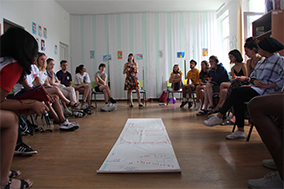 ings are moving in Prahova! With the help of local youngsters, a cosmopolitan group of young volunteers is working hard on the ambitious undertaking to organize the first rural youth festival of the county: the Ruralympics.
ings are moving in Prahova! With the help of local youngsters, a cosmopolitan group of young volunteers is working hard on the ambitious undertaking to organize the first rural youth festival of the county: the Ruralympics.
Lucrurile se mișcă în Prahova! Cu ajutorul tinerilor din zonă, un grup cosmopolit de tineri voluntari lucrează din greu la organizarea unui ambițios și prim festival rural de tineret din județ: Ruralympics.
Coming from 19 different countries, they’re taking part in this Romanian project thanks to the European Solidarity Corps, which supports European mobility and encourages volunteering actions. Motivated and willing to put their skills at the service of the region’s development, they’re working with the non-governmental organization Curba de Cultură. It focusses on improving education levels and on the community engagement for the young people living in rural environm ent, but also on the personal and professional development of the volunteers. Either in charge of budget, logistic, promotion or coordination and hosting, they have the opportunity to improve their skill and to learn new competences by organizing this big event.
Venind din 19 țări diferite, ei sunt parte din acest proiect mulțumită Corpului European de Solidaritate, programul care sprijină mobilitățile europene și încurajează acțiunile de voluntariat. Movitați și dornici să își pună abilitățile în serviciului dezvoltării regiunii, ei lucrează împreună cu organizația neguvernamentală Curba de Cultură. Focusul lor este îmbunătățirea nivelului educațional în ce privește implicarea comunității pentru a sprijinii tinerii din mediul rural, dar și dezvoltarea personală și profesională a voluntarilor. Fie că e vorba de buget, logistică, promovare, coordonare și găzduire, aceștia au ocazia să îți îmbunătățească abilitățile și să adune noi competențe organizând acest eveniment.
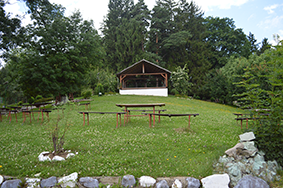
Taking place in the lovely park of Schiulești, among the trees and the hills, it will start the 2nd of august, at 10:00 am, and finish the 4th, at 23:00. Open to everyone, the aim is to promote rural life and its good sides. For this, you will be able to take in typical everyday activities of the region, such as milking a cow or participating in a woodcutting contest with Stihl Timbersports®.
Ruralympics are loc în frumosul parc din Schiulești, printre arbori și dealuri și va începe de la 10.00 dimineața pe 2 august și se va încheia la 23.00 pe 4 august. Este deschis pentru toată lumea, iar scopul festivalului este să promoveze viața la țară și avantajele ei. Pentru acestea participanții vor putea participa la activități de zi cu zi din regiune, precum mulsul vacii ori să ia parte la o competiție de tăiat lemne împreună cu Stihl Timbersports®.
In the program, a lot of fun; mini-games, sport activities, face painting, treasure hunt, dance workshop, open mic, mamaliga Master Chef, opportunity fair and much more! So if you want to spend good time in a very friendly atmosphere, among wonderful surroundings, and have a glimpse or rural life, this is the place to be!
În program avem multă distracție, mini-jocuri, activități sportive, vânătoare de comori, desene pe față, ateleir de dans, microfon la liber, mămăliga Master Chef, târg de oportunități și încă multe altele! Deci, dacă vrei să te simți bine într-o atmosferă prietenoasă, într-o zonă frumoasă și să guști măcar un pic din viața la țară, acesta e locul unde trebuie să fii!
Comunicat de presă – RURALYMPICS
Comunicat de presă
29 Iulie 2019
RURALYMPICS
Ruralympics, primul festival rural pentru tineret din România, este în curs de pregătire!
Ruralympics (Rural Olympics) este un eveniment de trei zile plin de provocări creative în diverse discipline bazate pe cultura rurală și a luat naștere în inima județului Prahova, fiind co-creat cu ajutorul unei echipe interculturale de tineri.
Festivalul a fost gândit cu scopul de a prezenta și recompensa abilități ce derivă din viața satului, și de a scoate în evidență partea distractivă a mediului rural. Ne dorim să creăm un context pentru localnici să se întâlnească și să petreacă timp de calitate împreună, construind astfel un sentiment de comunitate. Vrem să arătăm așadar potențialul acestui tip de activități pentru dezvoltarea comunitară, ele fiind benefice prin crearea unui cadru ce stimulează cooperarea, convivialitatea și inovația.
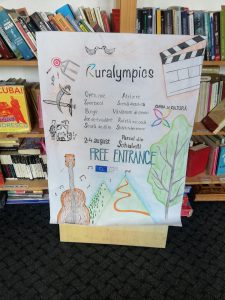
Trailer promo AICI.
Pe tot parcursul celor trei zile de festival vor decurge în paralel o serie de activități ce se vor afla în continuă desfășurare precum jocuri tradiționale, ateliere, jocuri sportive, concert cu muzicieni locali și spectacole de dans, schimb de obiecte, concursuri și multe altele! Deși focusul evenimentelor este pe tineri, vom avea câte ceva pentru toată lumea, indiferent de vârstă, așa că nu ezitați să veniți cu toată familia sau grupul de prieteni și să participați la jocuri, să vă uitați la cinema în aer liber sau să petreceți niște timp în locurile special amenajate unde puteți bea ceva rece și vă puteți relaxa.
Dintre activitățile pe care inițiativa le va pune la dispoziție putem enumera: competiție de tăiat lemne, de gătit, de dat cu sapa și de curățat legume; jocuri de evadare și vânătoare de comori; karaoke; diverse jocuri individuale și de echipă, mini-jocuri, jocuri de masă, jocuri cu hârtie, precum dixit, oina, concurs de avioane de hârtie, ȚOMAPANT și muulte altele. Avem și multe premii pregătite!
Sâmbătă vom avea și un târg de oportunități, acesta constând într-un stand cu materiale informative pentru tineri unde aceștia pot afla diverse opțiuni privind programe de voluntariat, formare, training, internship și alte modalități de dezvoltare personală și profesională, atât la nivel național cât și internațional.
Duminică, în cea de-a treia zi de festival, vom avea o scenă deschisă oricui (open mic), așa că dacă vă place să cântați sau dansați, să spuneți bancuri, să faceți stand-up, sau aveți alte talente sau abilități pe care ați vrea să le împărtășiți cu ceilalți, vă așteptăm (la fața locului sau printr-un mesaj în care vă manifestați interesul pentru activitate)!
Festivalul va avea loc în Parcul Schiulești al comunei Izvoarele și se va desfășura între 2 și 4 august, începând cu ora 10 și până în jurul orelor 22 – 23. Intrarea este liberă!
Detaliile și programul sunt în curs de actualizare, așa că fiți cu ochii în patru pe pagina evenimentului, AICI!
Ruralympics este un eveniment organizat de echipa de inițiativă a proiectului SUS (Suit ‘Ur Summer), cofinanțat prin programul Corpul European de Solidaritate, fiind un proiect de solidaritate la nivel local, care sprijină activitățile gestionate de tineri pentru tineri. Acest eveniment și multe altele care vor urma pe parcursul verii, sunt pregătite de Ion, Andreea, Simina, Oana, Diana, Kristina și Sorin cu ajutorul echipei de voluntari internaționali și locali.
Curba de Cultură este o organizaţie neguvernamentală, nonprofit, dedicată învăţării nonformale, culturii şi oportunităţilor de participare ale tinerilor din mediul rural din România. Scopul asociaţiei este de a revitaliza mediul rural din România. Misiunea Curbei de Cultură este să contribuie la dezvoltarea adolescenţilor şi tinerilor ca parte integrantă din comunităţile în care trăiesc, folosind educaţia nonformală ca sistem complementar sistemului formal de educaţie.
How can technology help to reduce waste?
According to ONU the world population will reach 8.3 billions people in 2030 with an increase of 1 billion people in 13 years. In all of the challenges of a massive increase of the population the increase of waste is one of the biggest. According to a scientific magazine “Science Advances” more than 13 billions tons of waste will be thrown at landfills and at the environment at 2050 if the rates of waste production keep the same.
This is major issue for our Planet Earth and for our own health. With so many tons of waste being produced every day over the entire globe the employes in this industry can not keep up with every trash that enters the center, for example the Sims Municipal Recycling Facility in Brooklyn is the largest recycling facility in the USA it receives around 800 tons of recycling material every single day so with this amount of trash its normal that human employees can’t keep up with everything therefore needing help from technology.
Ok when we think about technology we think about very complex things like flying cars but in this case technology can be as simple as huge magnet to separate metal from plastic. Yes of course there are more complex of using technology for example:
In 2010 in Japan a scientist by the name Akinori Ito developed a machine that turns plastic bags into oil basically the inverse process of how plastic bags are made. This machine is so revolutionary that during the process it does not release polluting gases to the environment is totally “Green”. This invention created in 2010 is capable of transforming 1kg of plastic bags into 1l of oil and it has been already sold to 80 countries
model of Akinori Ito machine
In my opinion in the future I thinks that this waste problem can be solved with a huge help of technology but i’m also afraid that we start to make drastic changes when its too late, we can’t only depend on technology to solve this problem we need to take measures as well. What do I mean with this? Recycling is one of the main option but not only check in your town there must be a kind of event to clean the streets, beaches. There nothing like that in your city? Why not creating your own? If we wait too much to start to do something regarding this topic it can be too late for the Earth and for us. We were given so much the only planet in the solar system with life. I mean, we are one in a million and I don’t wanna get too spiritual, but how are we not a miracle? We are perfectly positioned to the sun so we don’t burn but not too distant so we don’t turn to ice. As Richard Williams once said and I quote “Planet Earth is 4.5 billion years old. Mankind? About 140,000 years old. Let me put that in perspective. If you condense the Earth’s lifespan into 24 hours, that’s one full day, then we have been here on this planet for… three seconds.”
Three seconds and look what have we done, we call ourselves Homo sapiens aka wise man, but are we so wise? Wisdom is different.While intelligence speaks,wisdom listens and we covered our ears to mother nature screams and closed our eyes to all her “Help Wanted” signs. One thing i’m sure only if we do this together as humans we can make it to the fourth second.
Interactive lessons on animal protection / Lecții interactive privind protecția animalelor
Although situation concerning animal rights in my homeland, (Croatia), is far from an exemplary one, the number of street dogs and cats in Romania as well as the number of dogs that could be seen kept on very short chains in backyards left me in an unpleasant surprise. After an initial shock the easiest thing would be to let anger and prejudice shape one’s attitude towards the situations. It is also very easy to forget that people’s behaviors are influenced by their environments and that most of the time they do bad things not out of cruelty but because the lack of knowledge. Hence, in situations like this one it is much more useful to approach the problem with patience and openness to a dialogue.
Having been given the privilege and the responsibility to participate in shaping some young minds in Romania, I decided to spend a couple of school hours dedicated to the topic of animal protection. I also decided to broaden the topic on animals in different industries. My first lesson on the topic was with the ninth grade in Maneciu and, honestly, before the class even started I was worried it would turn out to a disaster. How do I get an average teenager think about cruelty of meet farms and animal testing in cosmetics industry? In the worst case scenario the students would see me as a militant vegetarian enforcing her propaganda.
When the class started, my fears faded away. The students approached the topic with curiosity. Their ideas and opinions showed empathy, humor and honesty. “I feel very sad for the chicken but I also love to eat them.”, a sentence that actually in a very simple and unpretentious way sums up all the problematic. At the end of the lesson I didn’t leave the classroom full of new animal rights activist, of course, but I did leave this young people with many new questions and information that by their own words were completely unfamiliar to them before the class. I am not so naïve to think that talking 50 minutes about animal rights will fully change their attitudes but I am very happy to at least scratch the surface.
With six graders I concentrated mostly on talking about stray animals and pets. During the debate they were supposed to move over the line placed in the middle of the classroom floor according to their level of agreeing with a certain statement and then elaborate why and how they chose their position. I have to say that I was very surprised how they listened to each other and treated each other’s opinions with respect. Most of them agreed that animals deserve shelter, that it is not right to physically harm animals and that it is necessary to take sick animal to a vet. However, when the topic of neutering came up, children were very indecisive. Some of them have witnessed horrible scenes like people burning alive newborn kittens and yet they believed that it is really important for an animal to have offspring even if that includes such tragic outcomes. Their view on that matter couldn’t be more different than mine but in the world where many adults remain indifferent to the environment surrounding them, taking sort of “whatever” attitude towards everything, it’s refreshing to see children who think and readily voice their opinions.
Before finishing my story, there’s just one little thing I’d like to mention. Sometime just one specific act of kindness can serve as more positive examples than all the theoretical discussion. That is the reason I would like to thank the former volunteers of Curba de Cultura who have adopted Fifty. Fifty is a former street dog who has been happily sharing home with the volunteers of Schiulesti for more than three years now. To avoid ending the article with some corny phrase, (and when speaking about a dogs it’s difficult for me not to), I’m offering you a photo of Fifty:
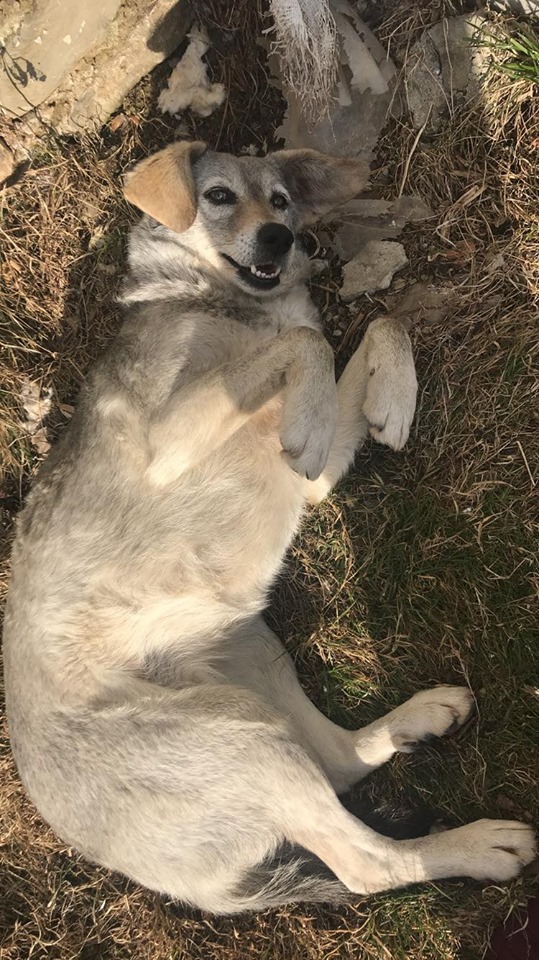
Deși situația privind drepturile animalelor din țara mea (Croația) este departe de a fi una exemplară, numărul câinilor și pisicilor străzii din România, precum și numărul de câini care pe care îi putem vedea ținuți legați cu lanțuri foarte scurte în curțile din spate, mi-au adus o surpriză neplăcută. După un șoc inițial, cel mai ușor lucru ar fi să lași furia și prejudecata să-ți modeleze atitudinea față de situații. Este, de asemenea, foarte ușor să uităm că și comportamentele oamenilor sunt influențate de mediile lor și că, de cele mai multe ori, fac lucruri rele, nu din cruzime ci din cauza lipsei de cunoștințe. Prin urmare, în situații ca aceasta este mult mai util să abordăm problema cu răbdare și deschidere către un dialog.
Având privilegiul și responsabilitatea de a participa la modelarea unor minți tinere în România, am decis să petrec câteva ore de școală dedicate temei protecției animalelor. De asemenea, am decis să extind subiectul asupra animalelor în diferite industrii. Prima mea lecție despre acest subiect a fost cu clasa a IX-a la Maneciu și, sincer, înainte ca lecția să înceapă, am fost îngrijorată că se va ajunge la un dezastru. Cum fac ca un adolescent obișnuit să se gândească la cruzimea fermelor de carne și la testarea pe animale în industria cosmetică? În cel mai rău scenariu, studenții mă vor vedea ca un vegetarian militant care își impune propaganda.
Când a început ora, temerile mele au dispărut. Studenții au abordat cu curiozitate subiectul. Ideile și opiniile lor au arătat empatie, umor și onestitate. “Mă simt foarte trist pentru pui, dar îmi place și să îi mănânc”, o propoziție care, într-adevăr, într-un mod foarte simplu și nepretențios, rezumă toate problemele. La sfârșitul lecției, nu am părăsit sala de clasă plină de activiști noi pentru drepturile animalelor, desigur, dar am lăsat acești tineri cu multe întrebări și informații noi care, prin propriile lor cuvinte, erau complet necunoscute înaintea orei. Nu sunt atât de naivă să cred că vorbind 50 de minute despre drepturile animalelor ei își vor schimba pe deplin atitudinea, dar sunt foarte fericită că cel puțin am atins subiectul.
M-am concentrat alături de 6 elevi vorbind despre animalele fără stăpân și animalele de companie. În timpul dezbaterii, ei trebuiau să se deplaseze peste linia aflată în mijlocul sălii de clasă, în funcție de nivelul lor de acord cu o anumită declarație și apoi să explice de ce și cum și-au ales poziția. Trebuie să spun că am fost foarte surprinsă de cum s-au ascultat unul pe celălalt și s-au tratat reciproc cu puncte de vedere. Mulți dintre ei au fost de acord că animalele merită adăpost, că nu este corect să se facă rău fizic animalelor și că este necesar să se ia animalul bolnav la un veterinar. Cu toate acestea, când a apărut tema castrării, copiii au fost foarte indeciși. Unii dintre ei au fost martorii unor scene oribile cum ar fi oameni care ard puii nou-născuți vii și totuși ei au crezut că este cu adevărat important ca un animal să aibă descendenți, chiar dacă acesta include asemenea rezultate tragice. Opinia lor în această chestiune nu ar putea fi mai diferită decât a mea, dar în lumea în care mulți adulți rămân indiferenți față de mediul înconjurător, luând o atitudine “indiferentă” față de tot, este răcoritor să vezi copiii care gândesc și își exprimă ușor opiniile .
Înainte de a încheia povestea mea, este doar un mic lucru pe care aș vrea să-l menționez. Uneori, doar un singur act de bunătate poate servi drept exemple mai pozitive decât toată discuția teoretică. Acesta este motivul pentru care aș dori să mulțumesc foștilor voluntari ai Curba de Cultura care au adopta-o pe Fifty. Fifty este un fost câine de stradă care a împărțit fericit această casă cu voluntarii lui Schiulești de mai bine de trei ani. Pentru a evita sfârșitul articolului cu o anumită frază (și când vorbim despre un câine este dificil pentru mine să nu), vă ofer o fotografie cu Fifty.
Tea este în România pentru o perioadă de șase luni, din decembrie 2018 până în mai 2019, în cadrul proiectului Volunteer to Grow [2017-1-HR01-KA105-035177] proiect co-finanțat de Uniunea Europeană prin Programul Erasmus+ și implementat în România de către Curba de Cultură.
How will EVS in Romania improve my CV ?

Hello everybody, today I want to write a special article. As written in the title it’s about the relation between EVS and CV. I know that sometime is very complicated to find quickly a job without this paper that traces your professional life. In my case, I wanted to continue my studies in a Master programme but when I finished my bachelor degree I had just a little professional experience. I studied Sociology and History and I wanted to pursue a Communication/Event Management Master. Every answer was negative because of lack of experience or simply because I had not done “the right studies”. But now I know how to improve my CV thanks to my EVS.
Making an EVS was the best idea I had. It’s an experience which can give you the keys to succeed. Thanks to EVS you can be more visible for the recruiters. Effectively, with EVS I improve myself for instance my competences for event organizing, work in an international teamwork, autonomy, communication in English… I succeed to find my professional way and what I want in my life. An EVS is a springboard for your CV, why? First you left your comfort zone, it means that nothing can disturb you. Secondly you went to meet different people and discover their daily life, in this way you are seen as an actor in society with an open mind. In addition during your EVS you must have had to accomplish some tasks, this gives you an experience that some people don’t have when they leave universities or schools.
And to finish the most important is the Youthpass. Is true that the Youthpass is a rather long file to do but it enhances EVERY competence, the things you’ve done and everything you’ve improved. It gives a general idea of your journey, what you have accomplished and what you know how to do. If you have doubts in your life, needs to refocus or make contacts so don’t hesitate to embark on an adventure with the EVS. This isn’t only an adventure for a few months, it can be helpful for the adventure of your life.
Julie este în România pentru o perioadă de opt luni, din noiembrie 2018 până în iunie 2019, în cadrul proiectului Voluntary Generation [2017-2-FR02-KA105-013326] proiect co-finanțat de Uniunea Europeană prin Programul Erasmus+ și implementat în România de către Curba de Cultură.
Aventură de 11 luni în Spania
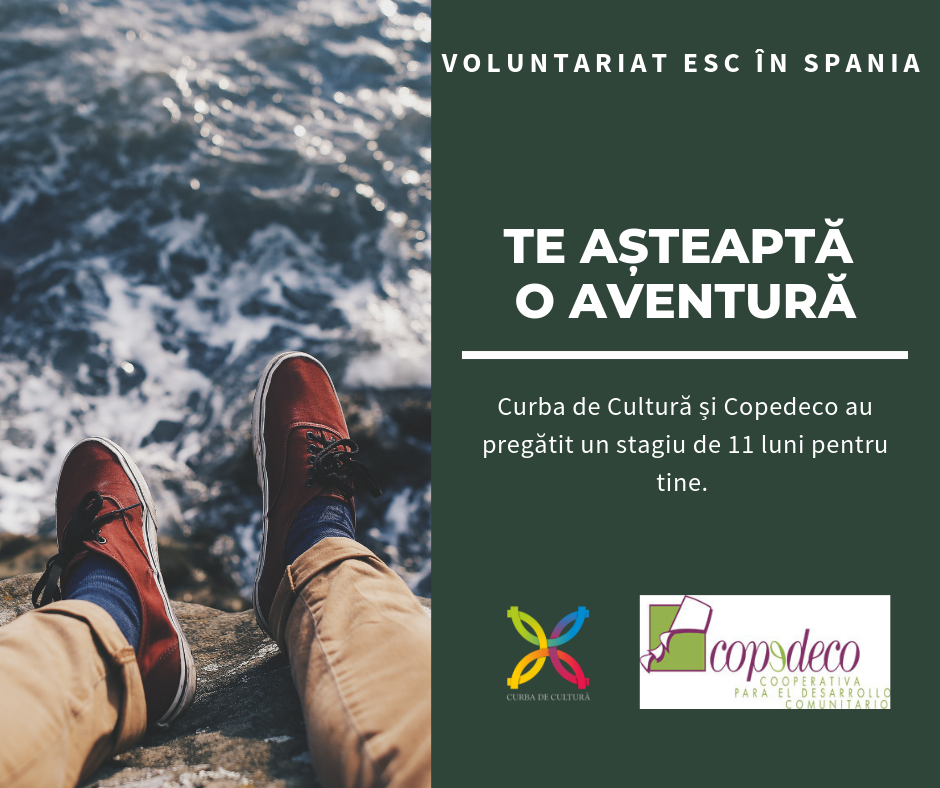
Partenerul nostru Copedeco , din Spania, caută un tânăr sau o tânără pentru un proiect de voluntariat internațional ce începe în septembrie 2019 (pentru 11 luni de zile). Voluntarii vor organiza activități concentrate pe incluziunea socială a copiilor și tinerilor vulnerabili și pe dezvoltarea propriilor abilități și competențe. De asemenea ei vor lua parte la planificarea de evenimente, comunicarea și promovarea online și vor avea și posibilitatea de a-și pune în aplicare propriile idei.
Prin urmare, dacă:
- ai între 18 și 30 de ani
- îți place să înveți și ești curios
- ești activ, lucrezi cu entuziasm și responsabilitate
- ești sociabil și te poți organiza și singur când e cazul
- ești creativ și dornic să îți pui ideile în practică
- ești interesat să lucrezi cu grupuri defavorizate (economic, social etc)
- înțelegi și vorbești engleză acceptabil
- ești dornic/ă să înveți spaniolă
ești potrivit pentru proiectul nostru de voluntariat.
Partenerii noștri din Spania îți vor asigura cazarea într-o casă împreună cu alți voluntari, o alocație pentru masă, bani de buzunar și transport local. Pe lângă asta, primești asigurare medicală și rambursarea transportului până acolo și înapoi.
Ce altceva mai primești?
- cunoștințe și abilități de planificare, organizare și implementare de activități educative și sociale
- posibilitatea de a-ți transforma ideile în proiecte și de a avea o influență pozitivă
- experiență de muncă în lucrul cu copii și organizarea de evenimente
- traiul independent și într-o altă țară
- posibilitatea de a învăța spaniolă și de a-ți extinde cercul de prieteni.
Mai multe detalii despre proiect, aici.
Acum că știi cu ce se mănâncă proiectul ăsta, pune mâna și scrie-ne un email cu CV și scrisoare de intenție (ambele în engleză) atașate în care ne spui de ce crezi că tu ești potrivit pentru acest proiect, cât mai repede la sorin@curbadecultura.ro.
Tot acolo trimiți și întrebările și nelămuririle dacă ai vreounele.
Acest proiect este finanțat de Uniunea Europeană prin programul European Solidarity Corps.

Training C4C – Communication for Cooperation – Next chapter
The training course “C4C – Communication for Cooperation” happened in Slovenia in the beautiful area of Ajdovščina town and her surrounded mountains.
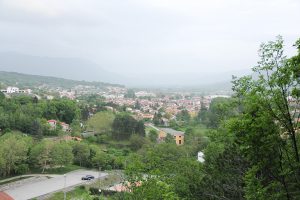
Olga, Laris, Nava and Pina hosted and welcomed us for 6 days of sharing, caring and learning moments. The participants from Portugal, Cyprus, Netherlands, Latvia, Italy, Finland, Spain and Romania gathered to focus on the communication as a tool of cooperation.
We had such a diversity of sessions and methods used in which it was easy to follow and to relate to some daily life situations, personal and/or professional. We set from the beginning a climate of confidence, tolerance and dialogue, in which everybody could feel comfortable to share experiences, knowledge or stories.
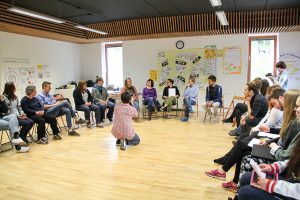
The different sessions of the week had a pleasant flow between theory, practice, visit and self-assessment. We emphasized different notions such as: how to use and receive feedback, how to use mediation and apply non-violent communication, the basis of transactional analysis, the practice of public speaking, the discovery of some ICT tools for the communication such as Canva, Meister task, Logbook, … and Slack, for which I chose to integrate of our communication channel inside our organization, and also took time to visit to the amazing Skocjan caves.
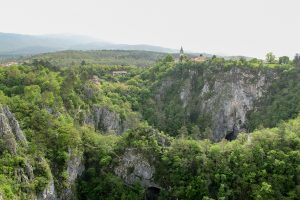
From different backgrounds, the participants were well guided to find their own path as personal level to deal with conflict and to establish a tolerant dialog through the situations we encounter.
All in all, this training in this peaceful place was the best opportunity to raise the importance of the communication skills and the tolerance we are showing towards others.
Different partners part of it: Associazione Agrado, Ha Moment, Together Cyprus, Open Sense, Word Up, Hyvarilao, Egeria Desarrollo Social and us Curba de Cultură.
The “fun” of learning Romanian – Cât de „distractiv” este să înveți română
If one believes the psychiatrist and communication scientist Paul Watzlawick, one cannot not communicate. Conversely, this means that communication can take place on levels other than language. With gestures, facial expressions, the verbalization of sounds, etc.
I have now been in Romania for three months within the framework of my EVS. I have already had all these experiences of the “other” forms of communication. When my decision was made and it was foreseeable that I would go to Romania, I decided (still in Germany) to learn at least some Romanian beforehand. I bought a dictionary, downloaded an app and wanted to inform myself on the internet.
Of course I didn’t use any of this and didn’t learn a single word of Romanian!
There are two ways (there is more but I concentrate on these two) to learn a language. In the context of a curricular lesson or the one of communicating with locals and learning the language through learning by doing.
I have the opportunity to do both.
In our curricular lessons I get to know the different sexes of the nouns or the different forms of adjectives. Of course I also learn the time and how to introduce myself to strangers. I try to find a structure and fathom why this noun is male or why this noun is female. I was told there is no rule. So learn. But if I want to buy sausage in a butcher’s shop, I have to know how this or that verb is conjugated? I don’t think so. This leads me to a funny story that is a good example for the ways of communication.
When I wanted to buy sausage for the first time in the butcher’s shop, I had a very amusing experience.
I wanted to buy two sausages to try them. I tried to make the saleswoman understand that I would like to have these sausages. That was simple. I pointed with my finger at the corresponding sausage. Easy. Then the challenge appeared. I had to make her understand that I would like to have two pieces . So I showed the number two with my fingers. I also said something in English, I was sure it would work. The saleswoman replied, of course, in Romanian. I was able to find out from the phonetics that it was a question. So I nodded my head and said “da”. That means “yes”. In Romanian!
So she began to pack the sausage. Only she didn’t stop after two. She went on and on and I looked very surprised. At some point I realized that my communication had failed. So instead of two sausages I got two kilos! Well, of course I didn’t have enough money with me and had to ask my roommate for the money. My roommates then had the pleasure to eat sausages with me the whole week. Thank God they were excellent sausages. God saves the misunderstandings!
If I had learned some Romanian before or asked my teacher this would certainly not have happened to me. But this story shows how important communication can be. Even if it’s just sausage.
I have never been good at learning foreign languages. I had four years of French at school and can hardly speak a few sentences.
And now I have to learn a language that is so very different from my mother tongue? That means fun!
But of course it is (for me) important to communicate with people in their mother tongue. Even if it is more difficult than I thought before. Some words are very similar to my mother tongue, which I can remember immediately. Important words like potatoes or slippers. Other words sound so abstract to me that I can’t remember them. What I have remembered are the colours. That has the simple reason that I now get the right tobacco and the right papers at the gas station. Nice!
I cannot not communicate. Even if the communication does not always fulfill the purpose I hope for. But that is exactly what gaining experience means. I am sure that nobody will ask me to use the right forms of verbs. But please, I should be able to communicate in the butcher’s shop!
I have another six months to deal with the language and to limit the communication to a verbal one.
The misunderstandings are the real fun. And as long as people still have something to laugh about, it’s totally OK for me.
But just wait and see, one day I will write an article in Romanian!
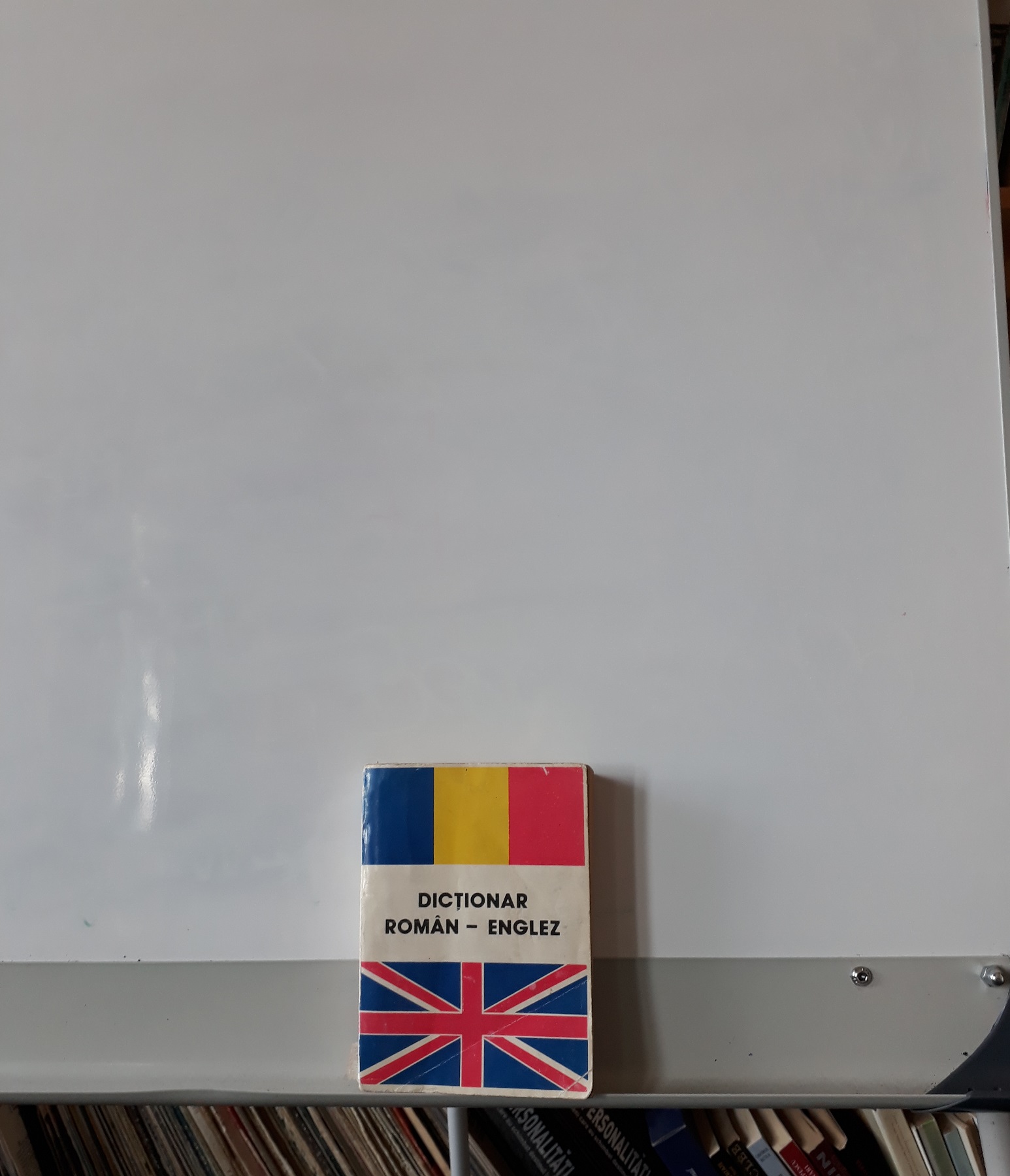
Dacă ne luăm după psihiatrul și specialistul în comunicare Paul Watzlawick, o persoană nu poate să nu comunice. Așadar acest lucru înseamnă că comunicarea poate avea loc și pe alte nivele decât cel al limbajului. Cu gesturi, expresii faciale, verbalizarea unor sunete etc. Sunt în România de 3 luni în cadrul proeictului meu SEV. Am experimentat deja „alte” forme de comunicare. Când decizia mea de a veni în România a fost luată, am zis (când încă eram în Germania) că voi învăța câteva cuvinte în Română înainte. Am cumpărat un dicționar, am descărcat o aplicație și am vrut să mă informez de pe internet. Bineînțeles că nu am folosit niciuna din astea și nu am învățat nici un cuvânt în Română.
Sunt două docuri (există mai mult de două dar eu mă voi concentra doar pe acestea) de a învăța o limbă. În contextul unei lecții pe baza unei curicule ori comunicândcu localnicii și învățând limba vorbind. Am ocazia de a le face pe amândouă.
Pe parcursul lecțiilor am aflat genurile substantivelor și diferitele forme ale adjectivelor. Desigur am învățat și timpul și cum să mă prezint strănilor. Încerc să găsesc o structură și să înțeleg de ce un anumit substantiv este masculin și altul este feminin. Mi s-a spus că nu există o regulă. Prin urmare învață. Dar dacă vreau să cumpăr cârnați de la măcelărie, trebuie să știu cum un anume verb se conjugă? Nu prea cred. Și asta îmi amintește de o întâmplare amuzantă, care este un exemplu bun pentru diferite canale de comunicare.
Când am vrut să cumpăr cârnați pentru prima dată de la măcelărie, am trăit o experiență amuzantă. Am vrut să iau 2 cârnați pentru a-i încerca. Am încercat să o fac pe vânzătoare să înțeleagă că vreau doi cârnați. A fost simplu. Am arătat spre cârnații pe care îi voiam. Ușor. Apoi a apărut provocarea. Trebui să îi explic că vreu 2 bucăți. Și i-am arătat numărul 2 cu degetele. Am zis și ceva în engleză, eram sigur că va funcționa. Vânzătoarea mi-a răspuns în română, bineînțeles. Mi-am dat seama că e o întrebare. Așa că am dat din cap și am zis „da”. Așa se zice „da” în română!
Așa că ea a început să împacheteze cârnații. Doar că nu s-a oprit după doi. A continuat și am fost foarte surprins. Atunci am realizat că comunicarea mea a eșuat. În loc de doi cârnați am primit două kilograme! Ei bine, nu aveam suficienți bani cu mine și a trebui să cer colegului de cameră. Colegii mei de casă au avut plăcerea să mănânce cârnați pentru toată săptămâna. Bine că erau excelenți. Dumnezeu salvează neințelegerile!
Dacă învățam mai multă română ori dacă îmi întrebam profesorul, asta nu s-ar fi întâmplat. Dar această întâmplare ne arată cât de importantă este comunicarea. Chiar și când e vorba de nite cârnați.
Nu am fost niciodată bun la limbi străine. Am avut patru ani de fraceză la școală și abia pot spune câteva propoziții. Iar acum trebuie să învăț o nouă limbă care este atât de diferită de limba mea maternă? Asta înseamnă distracție! Pentru mine însă este important să comunic cu oamenii în limba lor maternă. Chiar dacă e mai dificil decât am crezut înainte. Unele cuvinte sunt similare cu limba mea maternă și mi le amintesc imediat. Cuvinte importante precum cartofi ori șlapi. Altele sună foarte abstract și nu mi le pot aminti sub nici o formă. Ce îmi amintesc sunt culorile. Și asta pentru simplul motiv că am nevoie să cumpăr tutunul și foițele corespunzătoare la benzinărie. Mișto!
Nu pot să nu comunic. Chiar dacă comunicarea nu își atinge scopul la care sper. Dar tocmai asta este ceea ce înseamnă să aduni experiență. Sunt sigur că nimeni nu îmi va cere să folosesc formele corecte ale verbelor. Dar cu siguranță trebuie să fiu capabil să comunic la măcelărie!
Mai am șase luni să învăț limba și să comunic doar verbal. Neințelegerile sunt cele mai distractive. Atâta timp cât oamenii ai de ce să râdă, e perfect OK pentru mine. Aveți puțină răbdare, într-o zi voi scrie un articol în română!
Roman este în România pentru o perioadă de opt luni, din ianuarie 2019 până în septembrie 2019, în cadrul proiectului Building Youth Supportive Communities – Environment [2017-2-RO01-KA105-037748] proiect co-finanțat de Uniunea Europeană prin Programul Erasmus+ și implementat în România de către Curba de Cultură.
